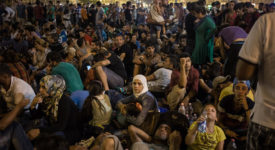Jean-Dominique Giuliani (The Robert Schuman Foundation)
Problems linked to EU migration policy are currently among the most discussed topics not only within EU institutions themselves but also in EU Member States. At the moment, Europe is facing an enormous challenge and it is therefore important how it will be tackled. It is obvious that migration is not a one-off problem but rather a complex issue requiring long-term struggle and engagement. An ideal outcome of that struggle should be a better and more elaborate system, thanks to which the EU should be able to solve new problems linked to migration in a more effective way.
The number of asylum seekers is constantly growing. Political instability and conflicts in some of the block’s neighboring countries are among the main causes contributing to this phenomenon. The EU is able to accept about 1.5 million asylum seekers annually, while the number of illegal migrants on its territory is steadily growing. For instance, during the first two months of 2015, the number of illegal migrants rose by 200 percent compared to the same period last year. The number is largely a result of the increasing number of migrants trying to reach the shores of Europe via the Mediterranean. Tragic events that have taken place during the migrants‘ journey towards a better life are currently the main drivers behind Europe’s efforts to prevent similar disasters in the future. EU political representatives are proposing a number of solutions but the question is which of the ideas put forward will eventually be implemented. The proposal to strengthen patrols along EU borders is often mentioned. The plan also presumes a broader scope of responsibilities for Frontex, or the European Agency for the Management of Operational Cooperation at the External Borders of the EU Member States.
Problems with the block’s migration policy, however, stem from the absence of a EU institution that would be in charge of this policy area and that would have clearly defined responsibilities, which would be unanimously approved by the EU. Moreover, in order to achieve its objectives, this institution should also have a set of coercive tools at its disposal. Currently, EU members cannot even agree on a general concept of such an institution. This gives rise to a number of questions and problems related to the migration policy: How to set an effective cooperation of EU Member States that would also work preventively? How to persuade citizens in each Member State that long-term cooperation and decisive measures are needed? The EU will hopefully approach the issue of migration responsibly and Brussels will also come up with effective solutions without endangering the values that it seeks to promote.
(The study can be downloaded here)






